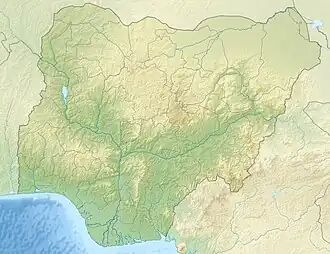Battle of Tabkin Kwatto
| Battle of Tabkin Kwatto | |||||||
|---|---|---|---|---|---|---|---|
| Part of Jihad of Usman dan Fodio | |||||||
| |||||||
| Belligerents | |||||||
|
Gobir Kel Gress Tuaregs Sullubawa Fulanis |
Sokoto Caliphate Agali and Adar Tuaregs | ||||||
| Commanders and leaders | |||||||
| Yunfa |
Abdullahi dan Fodio Ali Jedo Muhammad Bello | ||||||
| Strength | |||||||
|
1000+ infantry large force of light cavalry Tuareg camel corps 100 heavy cavalry[1] |
light infantry of mostly archers 20+ light cavalry[1] | ||||||
| Casualties and losses | |||||||
| Heavy | Unknown | ||||||
 Location within Nigeria | |||||||
Battle of Tabkin Kwatto (lit. 'Battle of Lake Kwatto') was the first decisive battle in the Fulani War. Abdullahi Ibn Fodio and Umaru al Kammu engaged the numerically superior Gobir cavalry at Kwatto Lake near the Capital fort of Gobir; Alkalawa. The Fulani archers employed a square formation which they successfully defended against successive charges by the Gobir cavalry. After taking severe losses, the death of the commander of Gobir's Armoured Cavalry eventually sealed the fate of the Gobirawa.[2]
Tabkin Kwatto is remembered as the turning point in the history of the Fulani War. The archer-foot lightly armed Fulani proved themselves effective against the well armed Hausa cavalry.[1]
References
- ^ a b c Smaldone, Joseph P. (1977). Warfare in the Sokoto Caliphate: Historical and Sociological Perspectives. Internet Archive. Cambridge University Press. pp. 27–29. ISBN 978-0-521-21069-0.
- ^ Last, Murray (1967). The Sokoto Caliphate. Internet Archive. [New York] Humanities Press. pp. 30–40.